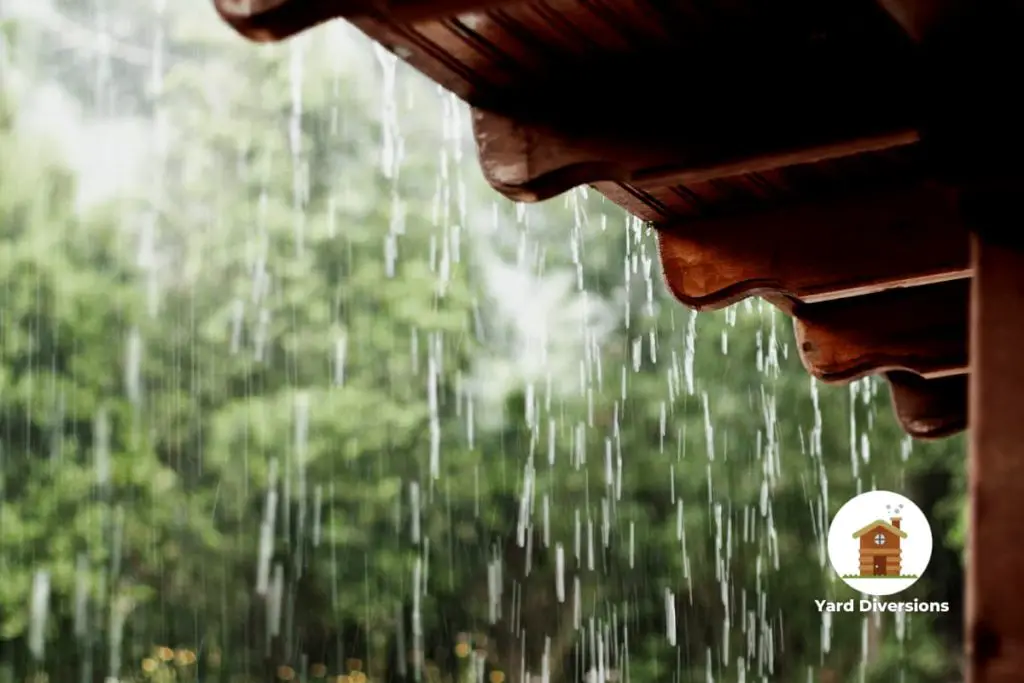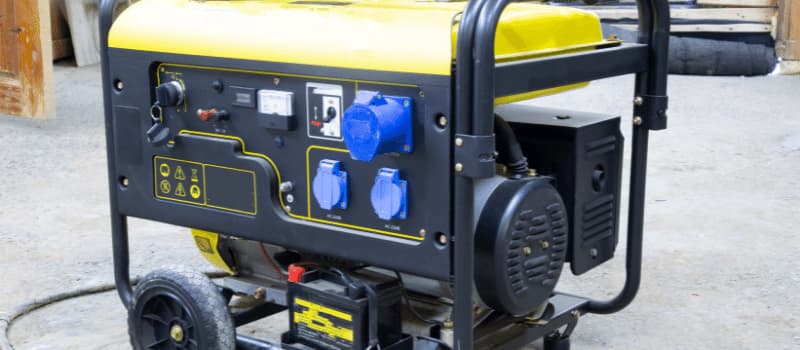If you have an outdoor generator, you may be wondering: Is it ok if it gets wet? Can you leave it outside in the rain without any repercussions? Or, do you need a cover? If so, here are some tips. Read on to learn more!
Listed below are the pros and cons of leaving a generator outside. A cover will protect your outdoor generator from the elements.

Is it ok for a generator to get wet?
If you’re using an outdoor generator outdoors, you might be wondering if they’re able to get wet. While they’ll still function fine if they’re dry, they’ll lose some of their power output when they’re wet.
To avoid this, you should make sure that the generator is dry when you use it, and you should keep it away from water and other sources of moisture.
One important thing to remember while using an outdoor generator is that it is not advisable to touch the unit when it’s wet.
Even if you’re wearing rubber-soled shoes, your hands might get wet and cause an electrical circuit to complete.
Additionally, it’s best to avoid touching the machine with both hands and only use one. This will prevent the electricity from flowing through your body and damaging your generator.
There are some situations where it’s okay to use your generator in the rain, but you should not put it in the middle of a swimming pool or near a sprinkler.
In addition, you should not use the generator if your hands are wet, or if you find ice on it. Water can cause electrical shock and serious electrocution.
You should never leave an unprotected portable generator outdoors in wet conditions, no matter how convenient it may be.
If you’re planning to set up your generator outdoors, it’s best to keep it out of the way of water. Make sure the ground isn’t wet when you set it up.
If you’re in a flood-prone area, it’s best to avoid placing the generator on a sloping area where it could be flooded.
Otherwise, you’ll risk putting yourself and your loved ones at risk if the generator gets wet.

Can you keep a generator outside in the rain?
If you can’t keep your generator inside the house, there are a few things you can do to protect it.
A pop-up canopy is an easy way to protect your generator from light rain, snow, or wind. It will also protect the generator from sunlight and harmful exhaust fumes.
This shelter is best for use outside, not in your basement. But you should consider the type of weather you’re facing, because it might influence the design of the enclosure.
Although power and rain don’t mix well, it’s possible to run a generator outside in the rain. If you build a shelter, such as a tent, you can keep the generator dry and safe from rain.
Otherwise, you’ll need to take extra precautions. The rain can damage the engine and cause a short circuit.
A suitable enclosure will help keep the generator dry. Nonetheless, you can’t leave the generator unprotected in the rain.
If you must keep your generator outside, you can purchase portable generators. They’re easy to set up, inexpensive, and lightweight.
In addition, they have an open bottom that allows air to circulate. This helps the generator run properly.
Make sure to protect the wiring and keep it out of the rain, as the voltage of the generator is high enough to be dangerous.
You can also try a dynamo that runs on propane, but it won’t be effective when the rain starts pouring down on it.
Can a generator get rained on?
Generally speaking, generators should not be operated in rainy weather. If you are in doubt about its suitability for outdoor use, you should buy a generator cover.
A generator cover serves as waterproofing for the machine. It also protects sensitive parts of the machine from the elements.
The following are some tips to ensure the safe operation of your outdoor generator. Make sure you dry the generator before re-connecting it to the power supply.
Portable generators should always be elevated on a woodpile or other surface when not in use. If left outside, they can get wet and electrify.
Rusting inside a generator can cause it to electrify, posing a fire hazard or shock hazard. Because of this, it is essential that you keep your generator as dry as possible when it is not in use.
If you find your generator is exposed to rain, stop using it immediately and do not turn it on. The risk of electrocution is increased, so you should cover it as soon as possible.
You should also unplug any cords and cover the plug openings with plastic bags or duct tape. You should also use a dry cloth to clean the machine of excess moisture.
However, this should not be an option in all situations.
Do You Need a Generator Cover?
Having a cover for your generator is essential to prevent it from becoming damaged due to rain and harsh weather. There are many different types of generator covers.
One of the best choices for generator covers is made of a 600-denier polyester material with a waterproof PVC coating. These covers are available in three different sizes and are very affordable.
Buying one now will keep your generator safe for years to come. Read on to learn more about the benefits of purchasing a generator cover.
When choosing a generator cover, it is important to consider how much coverage you need. Most covers feature plastic buckles for easy installation.
Some even feature flaps that open for access to the handle. If you plan on moving your generator often, you might want to consider buying a cover that is easy to remove and install.
The following list will help you narrow down your choices. By choosing a generator cover that fits your specific generator size, you can protect your equipment from rain, wind, and UV rays.
The first thing to consider when choosing a generator cover is how well it protects your generator from rain and other elements.
Your cover should protect the top and sides of your generator while still allowing air to flow. Make sure that your generator cover will not impede ventilation and allow air to reach the engine.
If you need to use your generator outdoors in poor conditions but while running, you should consider buying a Zombiebox steel enclosure.
This type of cover will be able to withstand storms while allowing the generator to run.
Where should a generator be placed in a storm?
When a storm is brewing, you need a safe place to put your generator. You should place it about 20 feet away from your home, if possible.
As with any other equipment, you should take all safety precautions possible. If you use the generator in the wrong way, it can be deadly.
The National Safety Council(1) reports on how many people are killed every year due to generator misuse. In hurricane Laura(2), generators were among the leading causes of death.
Before a storm, always inspect your generator. Connect all appliances and check the fuel tank. Also, make sure the generator is free of cracks or leaks.
If there are any, replace them as soon as possible. Lastly, check the fuel lines. Check them for cracks or leaks and replace them with fresh ones.
Do not use your generator indoors as there is a high chance of carbon monoxide poisoning.
One common mistake that generator owners make is placing the generator indoors. Manufacturers recommend that generators should never be placed inside a home.
Although they may seem convenient, it’s not a good idea. Not only can exhaust fumes poison people, they can also harm animals and other pets.
Therefore, never operate your generator close to doors and windows. Leaving it outside is an even worse mistake.
How Can I Protect My Outdoor Generator When Building a Paver Patio?
When building a paver patio, it’s important to consider the placement of your outdoor generator. To create your perfect patio space, ensure that the generator is positioned in a well-ventilated area and protected from the elements. Consider building a small enclosure or using a weatherproof cover to safeguard your generator.
What Should You Do if a Generator Gets Wet
If you are running your outdoor generator near a flooded area, be sure to shut it off.
Electricity flows in the path of least resistance, so you should make sure that you’re wearing rubber-soled shoes when touching metal parts.
You should also never place it near a combustible material such as a woodpile or metal trash can. Running it in wet conditions can cause serious damage to your machine.
Water can seep into its components, causing rust and a fire hazard. Keeping it dry will also help prevent electrocution.
The first step in drying out your outdoor generator is to remove any water that has accumulated on the components.
You can use indirect heat or a cool breeze to speed up the process. If possible, turn off your home power before using your generator to avoid electrical shock or damage the generator.
If you do not have a transfer switch, make sure you install one. In addition, use grounded extension cords to protect yourself from electrical shock.
If you notice that your outdoor generator has become wet, stop using it immediately. Avoid using it near a swimming pool or sprinkler.
If your hands are wet, wipe off any water that has collected on the generator. Another way to prevent electrocution is to unplug the generator from the outlet.
Also, make sure to cover any plug openings with a dry cloth. You should also avoid using the generator if it’s in an area with heavy rain or flooding.

